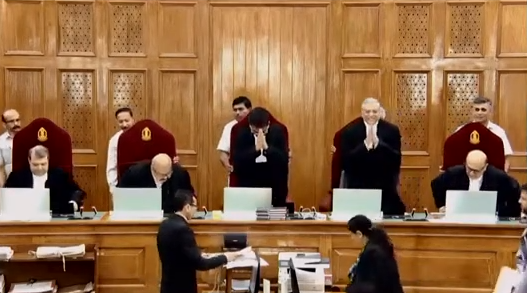The tenure of Chief Justice of India (CJI) Dhananjaya Yeshwant Chandrachud, who took office in November 2022, came to a close on November 10, 2023. His final working day as the head of India’s judiciary was marked by a significant ruling regarding the minority status of Aligarh Muslim University (AMU) under Article 30 of the Indian Constitution, underscoring the importance of his judicial philosophy and contributions during his time on the bench.
Who is Justice DY Chandrachud?
Justice DY Chandrachud, the 50th Chief Justice of India, is widely regarded for his empathetic and progressive approach to law, as well as his nuanced interpretations of constitutional rights. His career has been a testament to his unwavering commitment to justice, even when confronting complex and controversial legal questions.
Born into a family with deep legal roots, Justice Chandrachud is the son of Yeshwant Vishnu Chandrachud, who served as India’s longest-serving Chief Justice. DY Chandrachud was born on November 11, 1959, in Mumbai. His legal journey, marked by academic excellence and professional distinction, has made him one of the most respected jurists of his generation.
Early Life and Education
Growing up in Mumbai, Justice Chandrachud was influenced by his father’s legacy and the legal world around him. He completed his undergraduate studies in Economics at St. Stephen’s College, Delhi, before going on to earn his law degree from the University of Delhi’s Campus Law Centre in 1982. His academic journey continued with an LLM and a Doctorate in Juridical Sciences from Harvard Law School, where he developed a global perspective on law that would later influence his judicial philosophy.
A Distinguished Legal Career
Justice Chandrachud’s legal career spanned over several decades, during which he gained recognition for his exceptional work both as a practitioner and a judge. After graduating from Harvard, he practiced law at the Bombay High Court and the Supreme Court of India. In 1998, he was designated a senior advocate by the Bombay High Court. His judicial journey began in 2000, when he was appointed a judge at the Bombay High Court. By 2013, he was elevated to Chief Justice of the Allahabad High Court, and in 2016, he was appointed to the Supreme Court of India.

His appointment as Chief Justice of India in 2022 marked the pinnacle of his illustrious career, bringing with it an opportunity to shape the future of Indian jurisprudence.
Landmark Judgments and Judicial Philosophy
Throughout his career, Justice Chandrachud delivered several landmark judgments that have left a lasting impact on Indian law. His rulings often reflected his commitment to upholding individual freedoms, constitutional rights, and social justice.
1. Privacy as a Fundamental Right: In the landmark K.S. Puttaswamy v. Union of India case, Justice Chandrachud was a key voice in recognizing privacy as a fundamental right, a judgment that has shaped subsequent interpretations of data privacy in India.
2. Sabarimala Temple Entry Case: Chandrachud played a pivotal role in the judgment declaring the exclusion of women between the ages of 10 and 50 from Kerala’s Sabarimala Temple unconstitutional. His ruling emphasized that gender equality should take precedence over traditional practices, affirming the primacy of fundamental rights.
3. Bhima Koregaon Case: In the Romila Thapar v. Union of India case, Justice Chandrachud dissented on the arrests of activists accused of inciting violence, asserting that their right to free expression and personal liberty under Articles 19 and 21 of the Constitution had been violated.
4. Ayodhya Title Dispute: Chandrachud was part of the bench that delivered the historic verdict in the Ayodhya land dispute case, which brought a resolution to one of India’s most contentious religious issues while reaffirming the nation’s commitment to secularism.
5. Abolition of Section 377: Justice Chandrachud also contributed to the landmark judgment that decriminalized consensual homosexual activity between adults, further advancing India’s commitment to individual rights and freedoms.
A Legacy of Progressive Jurisprudence
Justice Chandrachud’s tenure as Chief Justice of India will be remembered for his ability to blend traditional values with progressive ideals. His judgments reflect a rare balance of empathy, intellectual rigor, and commitment to social justice. Whether advocating for privacy rights, gender equality, or free expression, Justice Chandrachud consistently pushed the boundaries of constitutional interpretation to uphold individual liberties.
His legacy will not only influence Indian jurisprudence for years to come but will also inspire future generations of legal scholars, practitioners, and judges. As his tenure concludes, his final ruling on the minority status of Aligarh Muslim University encapsulates his judicial ethos: a deep understanding of constitutional principles and an unwavering commitment to justice.
Justice Chandrachud’s contributions have significantly shaped the Indian judiciary and will continue to resonate as a testament to his vision of a just and progressive society.



